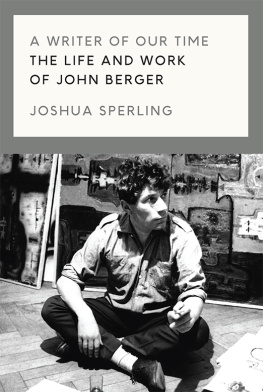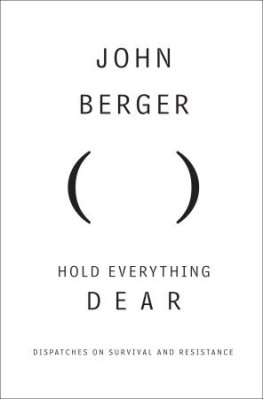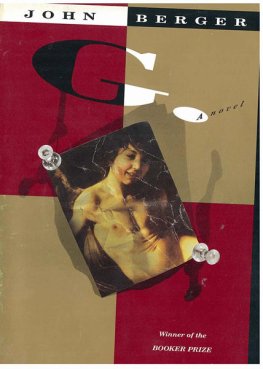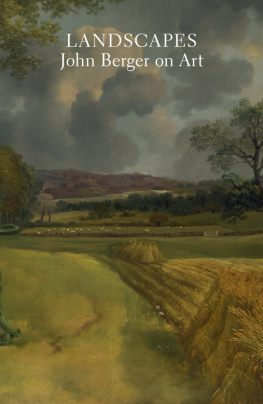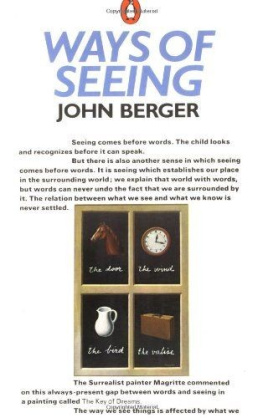Contents

A Writer of Our Time
A Writer of Our Time
The Life and Work
of John Berger
Joshua Sperling

First published by Verso 2018
Joshua Sperling 2018
Every effort has been made to secure permission for images appearing herein that are under copyright. In the event of being notified of any omission, Verso will seek to rectify the mistake in the next edition of this work.
All rights reserved
The moral rights of the author have been asserted
1 3 5 7 9 10 8 6 4 2
Verso
UK: 6 Meard Street, London W1F 0EG
US: 20 Jay Street, Suite 1010, Brooklyn, NY 11201
versobooks.com
Verso is the imprint of New Left Books
ISBN-13: 978-1-78663-742-0
ISBN-13: 978-1-78663-741-3 (US EBK)
ISBN-13: 978-1-78663-740-6 (UK EBK)
British Library Cataloguing in Publication Data
A catalogue record for this book is available from the British Library
Library of Congress Cataloging-in-Publication Data
A catalog record for this book is available from the Library of Congress
Typeset in Sabon by MJ & N Gavan, Truro, Cornwall
Printed in the UK by CPI Mackays, UK
For my parents, who were my first teachers,
and for Amy.
We never live only by our own efforts, we never live only for ourselves; our most intimate, our most personal thinking is connected by a thousand links with that of the world.
Victor Serge
Contents

H ad John Berger stopped writing when he left England in 1962when not for the last time in his life he gave up one existence to set out on anotherhe would be remembered solely as the young Marxist art critic for the New Statesman. Brash, passionate, outspoken yet terse (without a blush or an ahem, as one commentator put it), Bergers regular articles for the left-of-Labour weekly provided the most prominent outlet in England for a socialist understanding of culture. And this during a decade of bitter and bruising Cold War polemicsbattles that, even as they have since fallen into the shadows, left their mark on a generation.
Of course he did not stop writing. It was only after he moved to the continent, settling first in Geneva (with brief stints in Paris and the Luberon), and then the rural Haute-Savoie, that Berger began along the path he made his own. His subjects traversed nature, politics and art; his tools were a pen, a sketchpad and a motorbike. He wrote novels, essays, folk stories, so-called unclassifiable works of creative nonfiction. He collaborated on films, photo-texts, plays and broadcasts. Berger left England, he said, to get outside the straitjacket of English journalism. By the time he died, in 2017, he had attained the status of world elder.
Not that the English press ever particularly warmed to this new identity, or acknowledged the full scope of his achievements. In their eyes he remained, even a half-century later, the impertinent rabble-rouser he had been when he quit the homeland. On the occasion of his passing, on the second day of 2017, only months after Donald Trump had been elected to the White House and the British electorate voted to leave the European Union, the more profound connection between his work and the historical realities of its time still went unremarked. The string of obituaries mostly remembered him, in reportorial boilerplate, as controversial. They described an art critic who antagonized curators and professors with his many politicized contestations; a novelist who snubbed the Booker committee in 1972, donating half the prize money to the Black Panthers; and a television presenter who threw down a gauntlet with Ways of Seeing, taking on Sir Kenneth Clark in the process. The media always loves a duel, and Berger often obliged. True, they said, he was an incurable Marxist, a self-proclaimed revolutionary who went off to live with peasants, but he also wrote movingly about art. Now dead, aged ninety, he could be eulogized. Once yesterdays battles have been relegated to the historical attic, prior combatants stand to be remembered for their enlivening if impractical ideals. The establishment pats the back of a former opponent. And the past can be painted as distant when in fact its unheeded energies were washing up in that mornings headlines.
This book takes the opposite approach: the past is in the present, its story is alive. Especially for a writer such as Berger, driven onward year after year by a sense of history and the principle of hope, the currents that flowed through his work may still continue to flow. Multiple, connected, overlappingthey reach beyond the work itself. To trace their contours, to see where they came from or where they lead, is also to explore the landscape of a half-century that extends in all directions. However eye-catching, the polemics may only have been switchbacks of a longer journey. Beneath them ran complexities, at once historical and personal, the newspapers tended not to have space for.
The home Berger died in, for examplean airy suburban flat seven miles outside the French capitalbelonged to a Soviet-born writer, Nella Bielski, a woman he loved and had co-written plays with, whose novels he had translated. For decades Berger shuttled between here and another home several hours to the east, a chalet in the foothills of the Alps surrounded by fields and orchards, an old farmhouse he shared with another woman he loved, Beverly Bancroft, an American, his wife of several decades and the mother of his third child. While these pages will not veer too far into the private terrain usually reserved for traditional biographythere will be few to no doctor visits or domestic disputes and only occasional forays into the gap between persona and psychethe doubleness-of-attachment implicit in Bergers arrangement was emblematic of something deeper. There was far more to his work than provocation. There was also tension and multiplicity, movement and passion.
Speaking of the German-born playwright Peter Weiss (a fellow communist, migr, and painter-turned-author), Berger once said that his autobiographical novels were not concerned with revealing the secret difference between the writers private and public life but obsessed with the relation between the writers intimate self and the unprecedented events of his period.
The present book thus looks in two directions. On one hand, it sets out to provide a fuller picture of Bergers development, and of the stakes involved in his many creative metamorphoses. On the other, it explores, through his example and across a series of political watersheds, the larger questions that vexed a generation: questions about the purpose of art, the nature of creative freedom, the meaning of commitment, and the relationship of modernity to hope. These are questions that vex us still. When, aged thirty-four, Berger left England and his post at the New Statesman, he entered a field of activity where such linkagesacross time, across spheres of intimacy and experiencebegan to float free from the iron laws of short-term cause and effect. He said he moved to the continent to become a European writer. He ended up the spiritual lodestar of the humanist left: a keeper-of-conscience and one of the most globally significant voices of his generation.
W hat is literature? Why write? For whom? Though such questions have gone fitfully in and out of fashion ever since Sartre famously posed them in the pages of

